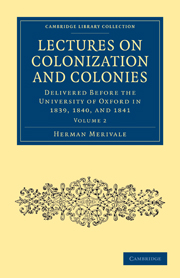 Lectures on Colonization and Colonies
Lectures on Colonization and Colonies Summary
The next position of the writers on systematic colonization which we have to consider, following the order proposed in my last lecture, is this; That the requisite abundance of available labour is to be secured by introducing labourers from the mother-country, or other well-peopled regions, and taking measures to keep them in the condition of labourers living by wages for some considerable time.
This proposition need not detain us long. Wherever a supply of dependent labour is necessary, the only means by which it can be now procured is free emigration; the only means by which it can be retained, preventing the labourers from passing immediately into the condition of landholders. It is true that the danger of their immediately aspiring to become owners of land must greatly vary according to the circumstances of particular colonies. The temptation in North America, where the soil has high agricultural capabilities, and accumulated capital is comparatively rare, must be much stronger than in Australia, where the land is generally barren, and high wages are attainable in the service of large proprietors. Consequently, the American back-woodsman is a farmer; the Australian “overlander” is a drover by profession. Still the danger every where exists, in a greater or less degree. And all other modes of obtaining labour, and all other modes of keeping the labourer in dependence, may be pronounced both unsuited to the genius of the present age, and demonstrably productive of more evil than good.
- Type
- Chapter
- Information
- Lectures on Colonization and ColoniesDelivered before the University of Oxford in 1839, 1840, and 1841, pp. 48 - 89Publisher: Cambridge University PressPrint publication year: 2010First published in: 1842
